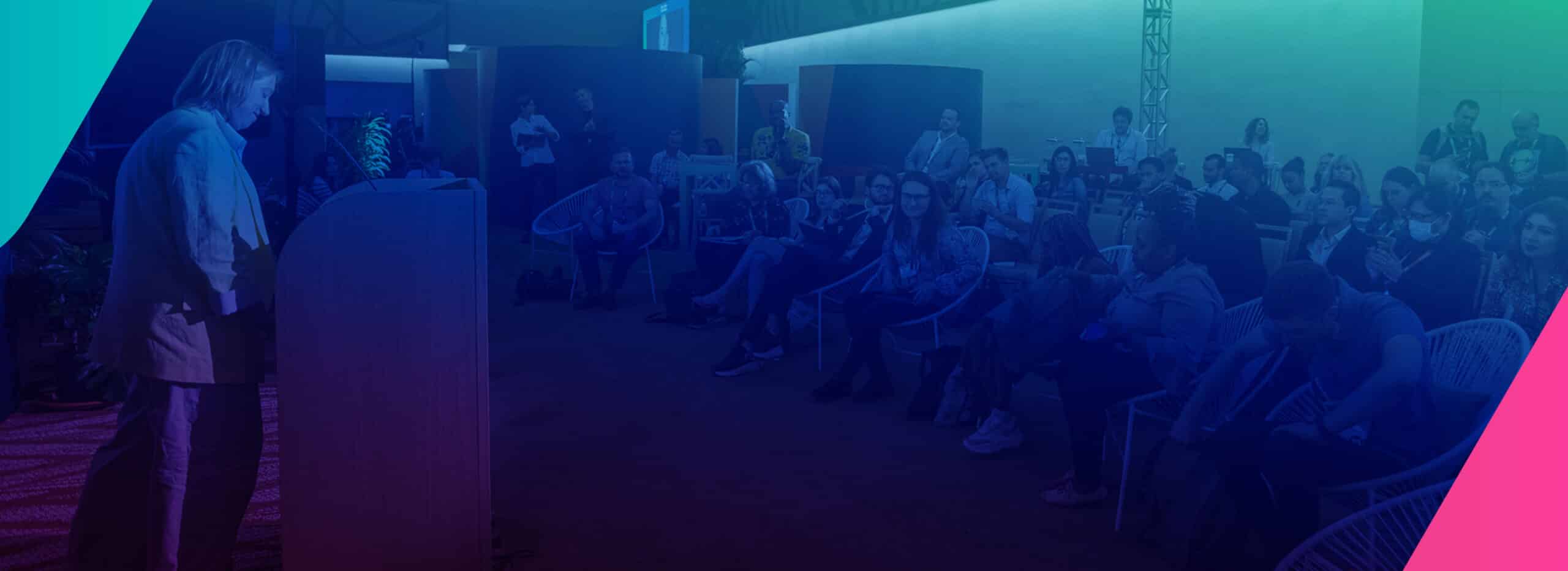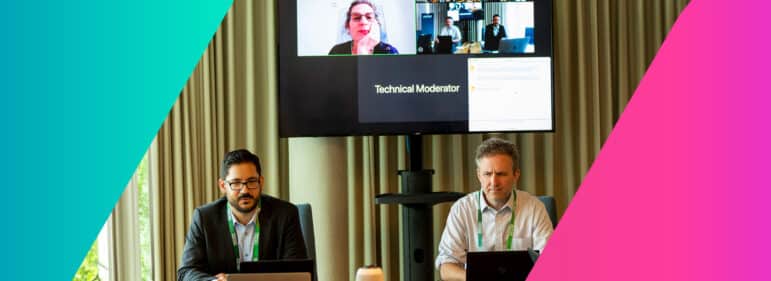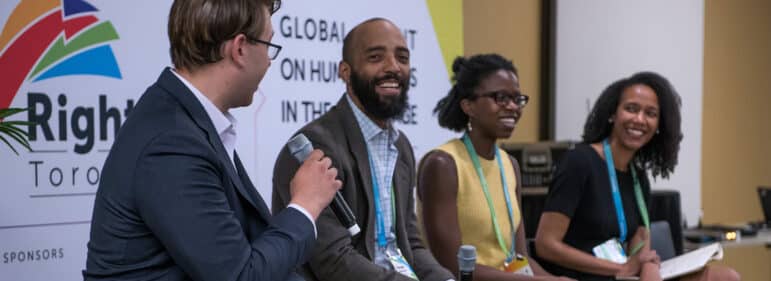Program Timeline

Outcomes
An outcome is the product of an effective session.
Once the session ends, how will you build momentum? How will participants continue to contribute and collaborate?
Below are examples of outcomes.
Create a coalition
Launch a campaign
Draft standards
Fund a project
Revise a resource
Hold a training
Resources
Excerpts from a successful proposal
Session description (in English)
“Digital ID systems continue to be implemented at national, cross regional and international levels. The growth of “digital public infrastructure” is being built upon the foundation of the digital ID system, most of which not only attempt to become systems for legal identity, but also to encompass access to essential public and private services, from social welfare and healthcare to banking and financial services. But at the time, most of these systems employ technologies that are damaging to human rights and have the potential to become pervasive surveillance mechanisms, such as biometrics and predictive analytics. Alternatives to the centralized model of digital ID and to the use of biometric technologies have arisen from different sectors, but none of them has reached a level of usage that made a significant impact.
In this conversation, we aim to discuss the different alternatives that exist to the current model of digital ID, and to imagine possible solutions and alternatives for what a model of rights-respecting, inclusive digital ID might become.”
What do you want to learn from participants during the session?
“We expect that participants will be able to propose ideas and discuss the challenges of the different alternatives and approaches in a way that will be conducive to the community having a better understanding of which alternatives might be better positioned to actually face the issues currently surrounding digital ID systems.”
How will participants continue to contribute and collaborate after the session ends?
“Participants will have the opportunity to join the digital ID community and/or the #WhyID list to continue engaging with the discussion in future meetings and working groups.”
Why is this a successful proposal response?
This proposal effectively tackles a relevant issue surrounding digital ID systems, inviting insightful discussions and aiming to catalyze concrete actions for the development of more ethical and inclusive systems. The session organizer has clearly articulated their goals of fostering discussions and exploring potential solutions and alternatives to the current model. By involving participants in envisioning a rights-respecting and inclusive digital ID system, the session aims to generate actionable outcomes that could potentially shape policy and practice in this domain.
Additionally, the session provides a framework for continued contribution and collaboration beyond its conclusion. Participants are encouraged to join the digital ID community and the #WhyID list, offering ongoing opportunities for engagement with discussions, future meetings, and working groups related to digital ID. This ensures that the dialogue initiated during the session extends beyond the summit itself, enabling participants to continue advocating for rights-respecting digital ID solutions.

Frequently Asked Questions
Whether you’re a newcomer or returning member of our community, take a moment to read about our program priorities and policies for RightsCon 2025.
Where do I submit a proposal?
The RightsCon proposal portal is a one-stop shop where you can submit and manage session proposals, apply for our Community Support Fund, and more. Create an account to get started!
You can propose a maximum of three sessions for consideration. Please note that the limit only applies to the number of proposals per person, not per host institution.
What are the roles in an online session?
Depending on the format, a session will include a number of different roles:
- A session organizer develops the session content and structure, and coordinates with facilitators and speakers at all relevant steps in the process.
- A facilitator leads discussion and activities, and steers participants to reach the session goal. Most, but not all, session organizers also choose to facilitate.
- A speaker frames the conversation from an expert’s perspective and offers ideas for participants to question and consider.
- A participant brings personal insights and experiences to the table and actively contributes to the session goal.
- A technical moderator (online) or room monitor (in-person) manages participant access, and ensures the session runs smoothly and ends on time. Our team will assign one technical moderator or monitor to every session room.
What is RightsCon 2025 approach to a “hybrid” program?
Hosted both online and in-person, RightsCon 2025 will mark our second hybrid summit. The program will support six session formats intended to foster moments of connection and collaboration, and a schedule which will enable live participation across different time zones.
Based on how you anticipate joining us for RightsCon 2025, you can choose to host your session online or in-person. Online sessions are run entirely on our custom summit platform, while in-person sessions are held at our venue in East Asia. You can pick either option, but once you submit the proposal form, your selection is final.
Based on timezones, budgetary, and team capacity constraints this year, we have decided to reduce the amount of sessions that include hybrid elements. For the roundtable and private meeting formats only, there will be a select number of sessions that will be elevated to support a two-way exchange between online and in-person participants. If you are a session proposer for these formats, and are interested in being considered for hybrid elevation, we want to know why bringing both online and in-person participants together is necessary to support your session goals. Please note that unlike online sessions, hybrid sessions will only be hosted from 9:00 a.m. – 5:00 p.m. local time. If your intended online participants cannot participate in that timezone, it is best to host your session fully online.
For more information on our program structure and strategy this year, check out our Call for Proposals launch blog, where you can find the changes we’re making for this RightsCon cycle thanks to the valuable feedback we received from our community during our consultation calls.
Where can I find helpful resources to support my proposal?
In addition to the guide for a successful proposal you’re currently reading, we have several tools at your disposal to support you in designing and writing a proposal that not only guarantees an excellent session, but guides you in advancing your goals at and beyond RightsCon. In our resources section, you will find guidance on participatory session design focused on online, in-person, and hybrid modes.
This year, we’re also unveiling a brand-new training series dedicated to helping session proposers craft strong proposals! These workshops will walk you through using our proposal platform and how to choose the best format to take your session goal from concept to reality. We’ll also host weekly interactive Q&As to provide you with the opportunity to meet other session proposers and raise any additional questions on the proposal process.
How does RightsCon support session organizers?
RightsCon convenes people from around the world to discuss critical issues and advance a shared agenda for human rights. If your proposal is accepted into the program, we’ll work with you to develop a participatory and action-oriented session, and provide training, resources, connections, and opportunities to network with other organizers, all in the service of building a program that reflects the diverse needs, priorities, and interests of our community.
At RightsCon, participants are not passive listeners, but active contributors. Your proposal should clearly articulate what you want to achieve and how participants will help you reach that goal. No matter the format, a well-structured session will make the best use of the people and perspectives in the room.
Can I host a session in any language?
Yes! While most sessions are conducted in English, the program supports many other languages, including Korean, Japanese, Arabic, French, and Spanish. In an effort to make RightsCon more accessible, the proposal form offers optional sections where you can submit answers in another language.
If the form presents a barrier to submitting a proposal for consideration, please reach out to our team at [email protected], and we’ll work with you to facilitate your participation in RightsCon.
What if I need funding to travel or participate?
RightsCon offers a Community Support Fund, available to those who wish to attend RightsCon in-person or online. The fund offers travel support for in-person participation (including travel, and accommodation, among other travel-related costs), as well as direct financial support for online participation (including connectivity, translation and other services).
While the fund is open to everyone, we prioritize applications from session organizers, facilitators, and speakers from communities who are traditionally underrepresented in global convenings. However, as a nonprofit organization with limited resources, we are unfortunately unable to guarantee funding to every applicant. Applications to the Fund will be open in early June and will be available through the RightsCon Proposal Portal.
What are RightsCon’s policies on diversity, equity, and inclusion?
We take seriously our responsibility to build a program and a summit space that reflects the diversity of experiences embodied by our community. RightsCon’s policies on diversity, equity, and inclusion aim to address dynamics of privilege and power that impede trust, openness, and collective action.
Diversity is one of our core evaluation criteria. As always, we welcome proposals that explore technology’s intersection with gender, race, ethnicity, religion, disability status, economic status, and/or other social, cultural, or personal identities.
Organizers should arrange session lineups with care and consciousness of regional representation, and representation of communities across regions – such as Indigenous peoples, Black communities, and people with disabilities – that are traditionally pushed to the margins and excluded from global convening spaces.
Access Now upholds a no-tolerance policy for men-only panels (“manels”). We also look critically at sessions that only feature perspectives from communities which perpetrate and benefit from systems of oppression, including but not limited to: colonialism, racism, classism, and land and resource exploitation.
We may reach out to organizers to offer feedback or recommend facilitators for sessions where these standards aren’t met. In rare cases, we may pull a session from the schedule if it violates our policies.
Access Now’s Code of Conduct establishes principles and expectations for participation at RightsCon. If you have ideas on ways we can better serve our global community, contact us at [email protected].
Get in touch
Have a question about submitting a session? Not sure where to start? Get in touch with us at [email protected] to chat with our team and receive tips and advice directly from the source.
Subscribe to the RightsCon Rundown for program updates, community news, and more.





